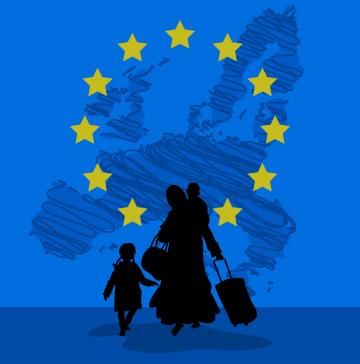Women refugees at high risk of being victims of gender-based violence

Access the monthly data collection highlights and gender-based violence >>
The report identifies a number of issues in relation to preventing, identifying and addressing victims of gender-based violence, including the alarming lack of data from Member States on violence against women and girls that are newly arrived or need international protection. It points to the shared use of bathrooms and showers in reception and accommodation centres particularly in the evenings or at night that are not separated for men and women. Sometimes such facilities are accessible via unlit corridors and doors that cannot be locked. Such issues expose women and girls to greater risks, and leave them feeling unsafe.
Victims rarely report their attacks. This is often due to fear about the repercussions on the victim’s asylum claim or from the perpetrator (especially when it comes to domestic violence), and the lack of information about what can be done. In some Member States, if they flee the centre without permission because of fear or because they have been attacked then they may also be judged as having committed an offence.
Various EU and national laws and policies take gender-based violence into consideration when it comes to granting asylum and when receiving asylum seekers. However, drawing on data from the nine Member States most affected by the migration flows, FRA has identified challenges in identifying, reporting and protecting female refugees which Member States should tackle. These include:
No Member State collects data on reported incidents of gender-based violence towards female refugees that have just arrived or need international protection.
- Information on gender-based violence, how to report it and where to seek help is not usually available in reception centres.
- Victims are reluctant to report to reception centre authorities or the police. Most Member States are taking steps to address this. These include: asylum interviews with women in private rooms by trained staff and interpreters of the same sex separated from the husband; information material and sessions; and ‘women-only’ spaces.
- Nearly half of the Member States have guidelines or procedures to identify and deal with victims. However, they are not always effective and training is often lacking.
- All Member States offer some form of prevention of gender-based violence and protection for victims. Most commonly this includes separate accommodation for newly-arrived unaccompanied migrant women and access to women’s shelters for victims. Sometimes victims can receive medical and psycho-social support, and report incidents of violence but protective and preventative measures are rarely comprehensive and seldom coordinated.
- Most Member States have no special procedures for children who are victims of violence.
- Some Member States lack legal support or adequate interpretation for victims of gender-based violence in reception centres.
To better protect female refugees the European Parliament has also recently called for new gender guidelines. In addition, the European Commission has suggested that the EU ratifies the Council of Europe’s violence against women convention (the Istanbul Convention) which also covers migration and asylum. It would then join the 14 Member States that have already ratified the Convention (all 28 have signed it) which provides a solid legal basis for addressing violence against all women.
The European Commission asked FRA to collect data about the fundamental rights situation of people arriving in Member States, particularly affected by large migration movements. The countries covered are: Austria, Bulgaria, Croatia, Germany, Greece, Hungary, Italy, Slovenia and Sweden.
FRA has published overviews since September 2015. Each overview covers different issues including:
- initial registration and asylum applications;
- criminal proceedings initiated for offences related to irregular border crossing;
- child protection;
- reception conditions for new arrivals;
- access to healthcare;
- public response such as rallies of support, humanitarian assistance or voluntary work;
- racist incidents such as demonstrations, online hate speech or hate crime.
While this month has a section looking specifically at gender-based violence, last month’s focus was on trafficking and smuggling. Next month will be on local communities.